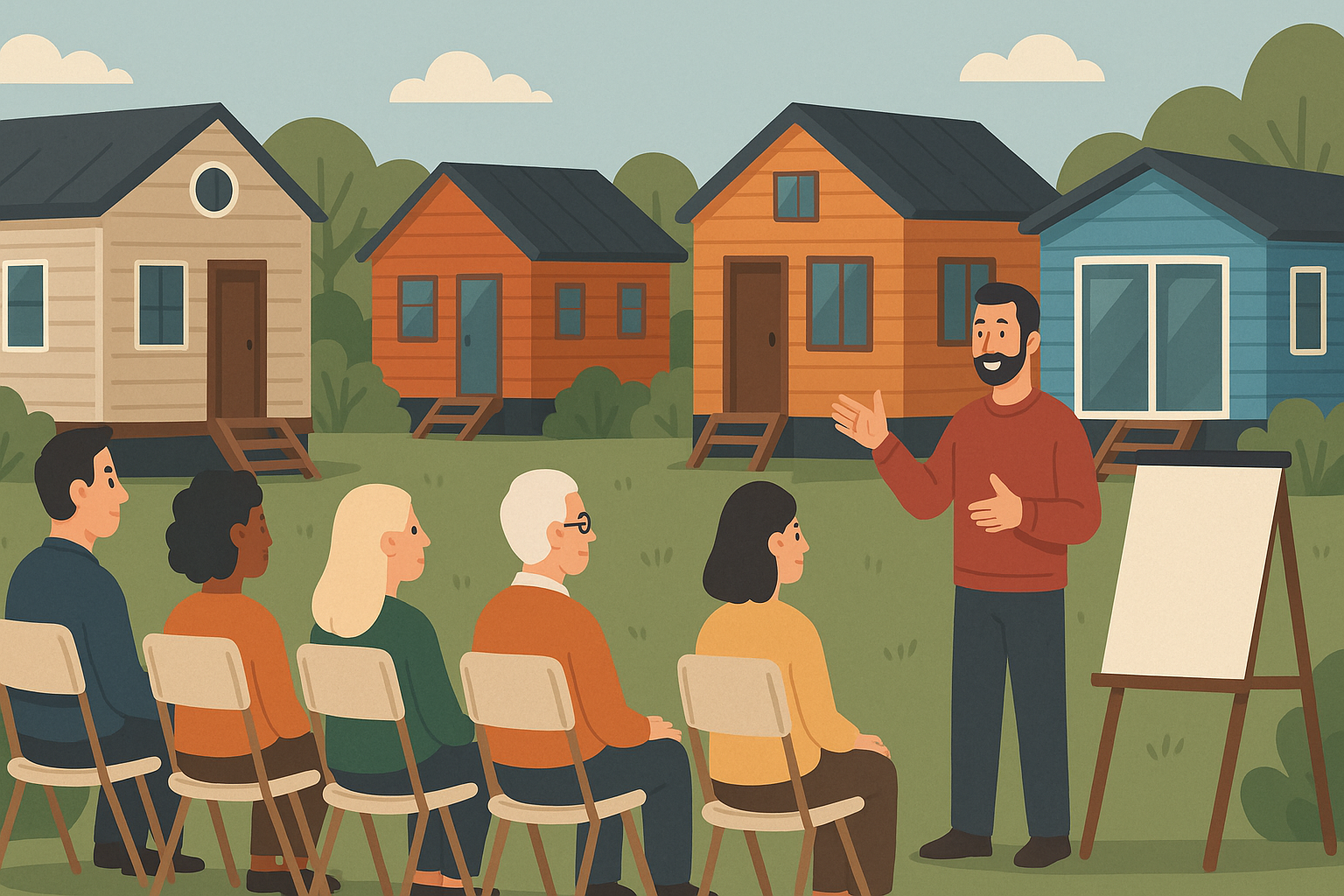
How to Create Effective Tiny Home Community Workshops in Canadian Neighborhoods
Estimated reading time: 8 minutes
Key Takeaways
- Empower Communities: Workshops build social engagement and practical skills in tiny home and ADU environments.
- Needs Assessment is Crucial: Understanding residents’ priorities sets a strong foundation for impactful events.
- Relevant Content: Tailored educational topics like sustainable living, home maintenance, and local bylaws foster real-life solutions.
- Interactive Formats: Hands-on activities, guest speakers and resource-sharing sessions boost community collaboration.
- Local Partnerships: Collaborating with local authorities, non-profits and energy utilities enhances event credibility and reach.
Table of Contents
- Introduction
- Understanding the Value of Tiny Home Community Workshops
- Step 1: Assessing Community Needs
- Step 2: Planning Educational Content
- Step 3: Organizing ADU Events
- Step 4: Encouraging Social Engagement
- Step 5: Leveraging Local Partnerships
- Measuring Success and Iteration
- Conclusion
- Frequently Asked Questions
Tiny home community workshops are organized educational and social events held within tiny home communities and Accessory Dwelling Unit (ADU) developments. These gatherings focus on sharing practical knowledge, teaching skills, and fostering relationships among residents living in compact spaces.
In recent years, Canadian neighborhoods have witnessed a surge in tiny home communities and ADU events. Residents turn to these forms of housing for affordable, sustainable, and communal urban living. Well-organized workshops help overcome unique challenges, share resources, and build strong support networks across cities such as Winnipeg, New Brunswick, and British Columbia.
This post is a step-by-step guide for creating impactful community workshops in tiny home neighborhoods or ADU developments. Learn how to design, organize, and sustain events that make a real difference.
For more insights on tiny home communities and their impact, read from CMHC’s inspiring story and explore community trends at NB Power’s blog.
Understanding the Value of Tiny Home Community Workshops
Workshops in tiny home communities and ADU projects are more than simple gatherings—they are vital platforms for building a sense of belonging, promoting cooperation, and sharing useful, everyday knowledge.
Why Workshops Matter:
- Encourage Social Engagement: Regular sessions help residents connect and support each other. For insight on crafting engaging sessions, check out this resource.
- Strengthen Community Bonds: Participatory projects and discussions build trust. See examples of co-living ADU developments where shared spaces boost ties.
- Share Valuable Skills: From maintenance tips to sustainable living practices, workshops create space for joint problem-solving and efficient resource use.
Workshop areas such as community gardening or repair sessions promote a collaborative culture where every resident has a voice.
Further reading includes stories from CMHC and community insights on NB Power’s blog.
Step 1: Assessing Community Needs
The first step for impactful ADU events and workshops is understanding what your residents need. A solid needs assessment ensures that the program is relevant, practical, and enjoyable.
How to Assess Community Needs:
- Create Simple Surveys: Use short questionnaires to identify topics of interest—whether it’s sustainable upgrades, repair tips, or permit challenges. Discover more survey tips from this guide.
- Host Informal Meetups: Arrange casual gatherings where neighbours can share their ideas. This informal setting is well illustrated in community-building stories.
- Identify Resource Gaps: Determine if there is a lack of tools, expertise, or knowledge that the workshops can address.
- Understand Local Challenges: Tackle region-specific hurdles such as extreme winters or unique bylaws. More details can be found at Canadian ADU success stories.
Tip: Involve residents early. When people help shape the event, participation and overall effectiveness increase tremendously.
Step 2: Planning Educational Content
Great workshops begin with great content. Create sessions that reflect real-life situations within Canadian tiny home communities.
Key Workshop Themes:
- Sustainable Living Practices: Topics include energy efficiency, composting, and renewable power. Learn more from NB Power’s insights at NB Power’s blog post and explore additional ideas at Tiny Sustainable Living Homes.
- Home Maintenance & Repair: Focus on winterizing, insulation techniques, and simple repairs—vital tasks in harsh Canadian weather. More tips can be seen at Winter Proofing Your Tiny Home.
- Bylaws, Permits, and Municipal Codes: Understand local housing regulations and permit processes. Detailed guidelines are available at Canadian ADU Regulations Guide and ADU Permitting in Ontario.
- DIY Projects: Include hands-on projects for space maximization, water conservation, or installing energy-saving devices. Check out smart integrations at Smart Home Technology for ADUs.
- Culturally Relevant Content: Invite Indigenous leaders or cultural experts to add local flavour to your sessions.
- Community Building: Plan group activities like shared gardens or art walls that foster a sense of belonging.
Tip: Choose topics that cater to both practical needs and social interests, keeping Canada’s unique context in mind.
Step 3: Organizing ADU Events and Workshop Formats
Structure and format go a long way toward keeping residents engaged. Well-organized events pave the way for continued participation.
Best Practices:
- Offer Hands-On Activities: Engage participants with practical projects like building raised garden beds or group weatherizing sessions. For inspiration, visit Tiny Home Community Startups.
- Feature Guest Speakers: Invite experts on energy, city regulations, or experienced tiny home owners. NB Power’s sessions, detailed at NB Power’s community events, are excellent examples.
- Resource-Sharing Sessions: Set up areas where tools and ideas are exchanged to spur peer-to-peer learning.
- Pick Suitable Venues: Use familiar spaces within the tiny home community or accessible local centers for larger gatherings.
- Plan Convenient Times: Evening or weekend sessions maximize attendance.
- Promote Widely: Leverage flyers, local bulletins, and digital platforms like community forums for effective outreach.
Step 4: Encouraging Social Engagement and Building Community Ties
Beyond information sharing, building solid relationships among neighbours is essential. Strong social engagement helps workshops evolve into a neighborhood tradition.
Ways to Foster Engagement:
- Start Group Projects: Organize team-based activities such as community gardens or art projects. See inspiring examples at Co-Living ADU Developments.
- Host Social Hours or Potlucks: Informal gatherings after workshops create relaxed environments for deeper connections.
- Open Forums and Feedback Sessions: Encourage residents to share their success stories, challenges, and new ideas.
- Set a Consistent Schedule: Regular monthly or seasonal sessions help establish a community rhythm. Detailed patterns are shared at Tiny Home Community Startups.
Step 5: Leveraging Local Partnerships and Resources
Local partnerships enhance the quality and reach of your workshops by infusing expert knowledge and additional resources.
How to Build Local Partnerships:
- Collaborate with Non-Profits and Agencies: Partner with housing non-profits or municipal housing authorities to access grants and expertise. More information is available at this resource.
- Connect With Energy Utilities: Invite representatives like those from NB Power to share energy-saving tips and rebates. Read about their work here.
- Engage Indigenous and Cultural Organizations: Incorporate local traditions with the help of Indigenous leaders to enrich workshop content.
- Coordinate With Municipalities: City planners and bylaw officers can provide crucial information on permits, zoning, and regulations. This helps tailor the events to regional specifics.
Measuring Success and Iterating on Community Workshops
To ensure that your workshops continue to add value, it is essential to measure their success and make improvements based on feedback.
Strategies to Evaluate and Improve:
- Gather Immediate Feedback: Use surveys, suggestion boxes, or roundtable discussions after each session. Learn feedback strategies at this link.
- Monitor Attendance and Participation: Track signup trends and session attendance to gauge topics of interest.
- Assess Outcomes: Evaluate if workshops are addressing the prior needs and if new skills are being applied.
- Iterate and Update: Use feedback data to fine-tune future topics, session formats, and guest speakers.
- Celebrate Success Stories: Share testimonials, photos, and project outcomes to create a sense of community pride.
Research from organizations like CMHC and NB Power reinforces the benefits of continual adaptation.
Conclusion: Pillars of Vibrant Canadian Neighborhoods
Well-organized community workshops are essential for nurturing resource-sharing, social engagement, and resilience in tiny home communities and ADU developments across Canada. Through targeted needs assessments, thoughtfully curated educational content, interactive formats, and robust local partnerships, these workshops transform small spaces into vibrant, supportive neighborhoods.
The rise of tiny home community workshops shows that intentional programming can inspire broad, positive change. Get involved, ask your neighbours what matters, and help launch the next chapter in connected living.
Discover more via leading sources such as CMHC, NB Power, and insights on community startups and co-living at Adustart and Co-Living ADU Developments.
Frequently Asked Questions
Q1: What are tiny home community workshops?
A: These workshops are gatherings designed to share practical skills and foster community relationships among residents living in tiny homes or ADU developments.
Q2: How can I assess my community’s needs?
A: Start with simple surveys, host informal meetups, and identify specific resource gaps. Involving residents early ensures that the workshops are tailored to their needs.
Q3: What topics are best suited for these workshops?
A: Topics should address sustainable living, home maintenance, local regulations, DIY projects, and ways to build community bonds through interactive activities and group projects.
Q4: How can local partnerships improve workshop quality?
A: Partnerships with non-profits, energy utilities, cultural organizations, and local authorities bring expert insights, additional resources, and wider community engagement to your events.
Q5: How do I measure the success of a workshop?
A: Track attendance, gather immediate feedback, assess if workshops meet residents’ needs, and use success stories to iterate and improve future events.

Leave a Reply